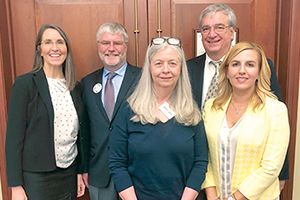Supporters urge continued push by Catholic health care community
By JULIE MINDA
After more than five years of focused advocacy work, Catholic health care leaders were gratified July 23 when the U.S. House of Representatives passed legislation that would provide incentives to increase the number of palliative care providers in the U.S., build public awareness of palliative care and support research in the care of the terminally and chronically ill.
According to the Patient Quality of Life Coalition, the Palliative Care and Hospice Education and Training Act, designated H.R. 1676 in the House and S. 693 in the Senate, would:
- Establish palliative care and hospice education centers to train health professionals in palliative care
- Create incentives for physicians and nurses to become palliative care educators or providers
- Establish fellowships with intensive coursework for clinicians, social workers, chaplains and other practitioners
- Increase awareness of palliative care services among providers and members of the general public
- Direct the National Institutes of Health to expand its focus on palliative care research

Taking part in a June 20 lobby day supporting the Palliative Care and Hospice Education and Training Act are, from left, Rev. Denise Hess, Dr. Gregg VandeKieft, Lois Lane, Dr. Robert Bergamini and Sarah Hill. Rev. Hess is executive director of the Supportive Care Coalition; VandeKieft is associate medical director for the Institute for Human Caring at Providence St. Joseph Health; Lois Lane is vice president of mission integration for Catholic Health Initiatives; Bergamini is medical director of the Mercy Kids Complex Care Team at Mercy Children's Hospital in St. Louis; and Hill is director of palliative care for Ascension.
At annual lobby days sponsored by the coalition — including one in late June just before the bill moved out of a house subcommittee — ministry advocates have been meeting with their legislators to urge support for the bill. The advocates have supplemented the in-person visits with ongoing calls, emails and other outreach. CHA, Trinity Health and the Supportive Care Coalition are among the 40-plus organizations that are members of the Patient Quality of Life Coalition.
Colleen Scanlon is senior vice president and chief advocacy officer of Catholic Health Initiatives and chairs the advocacy committee of the Supportive Care Coalition, a group of ministry organizations promoting high-quality, compassionate care for the seriously ill. She says the continued support of the Catholic health care community has been vitally important for the legislation's success.
Tool for growth
In the Senate, the bill is sponsored by Sens. Tammy Baldwin, D-Wis., and Shelley Moore Capito, R-W.Va. That bill has been referred to the Senate's Health, Education, Labor and Pensions committee and was pending action when Catholic Health World went to press. Lisa Smith, CHA senior director of government relations, says there is optimism that the bill could go to President Donald Trump for his signature this calendar year. The legislation has bipartisan support, says Smith.
The funding appropriation to advance and promote palliative care would proceed along a separate legislative track if the Palliative Care and Hospice Education and Training Act is passed.
Growth opportunity
Sarah E. Hill, director of palliative care for St. Louis' Ascension, says the workforce training component of the act would be a much-needed counterweight to a challenge inhibiting the growth of palliative care services — "there are simply not enough providers to fill open positions. The training for health care professionals would assist us in creating a pipeline of providers to be engaging in this important work."
Dr. Gregg VandeKieft, associate medical director of the Institute for Human Caring at Providence St. Joseph Health, adds the lack of physician specialists is a particularly pressing issue that the legislation would address.
Dr. Robert Bergamini, medical director of the Mercy Kids Complex Care Team at Mercy Children's Hospital St. Louis, says a national education campaign described in the bill would counter the problem of misconceptions or lack of awareness about palliative care. He frequently encounters members of the public and even of the medical profession who don't understand exactly what palliative care is and how and when it should be used.
He says the act's support for research is essential as well since there is comparatively little research on new alternatives to pain control protocols currently in use.
Lois Lane is CHI vice president of mission integration and she chairs the Supportive Care Coalition. She says the legislation's "multipronged approach is necessary because once you know what palliative care is and how it can help alongside the medical regimen, then everyone will want it. So we must be prepared to meet the need," she says.
The right time
VandeKieft notes the legislation is crucial given the nation's opioid epidemic, which to a large degree is connected with prescription opioid abuse. He says if medical professionals had a more specialized knowledge of palliative care approaches for pain control, it could be part of a solution to the opioid crisis.
Rev. Denise Hess, executive director of the Supportive Care Coalition, says that the legislation also is important given a demographic shift that will increase the number of elderly. Aging is associated with increased incidence and severity of illness and pain, so many more people could be expected to benefit from palliative care services going forward.
Ministry proponents of the legislation are asking their Catholic health care colleagues to continue to advocate for its passage.
Bergamini says, "Palliative care is about making today the best day possible and celebrating the life that you have — that's why it's a hallmark of Catholic health care. And that's why every Catholic ministry needs to … contact their representatives and express support for the bill."
|
Online information
CHA, the Supportive Care Coalition, the Patient Quality of Life Coalition and others have many resources online that provide details of the legislation and make it easy to contact legislators.
|
Copyright © 2018 by the Catholic Health Association
of the United States
For reprint permission, contact Betty Crosby or call (314) 253-3490.